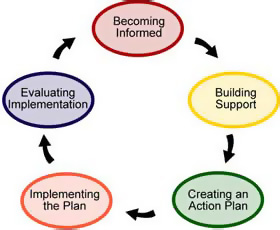RTI: Considerations for School Leaders
Wrap Up
 Adopting the RTI approach in a school requires a change in existing school processes. Principals and all school staff must keep in mind that the adoption and complete implementation of RTI is a long-term commitment. In addition, principals need to recognize that they will have to provide considerable support to their entire school staff. Click on the audio links below to hear what each professional has to say about implementing RTI in a school.
Adopting the RTI approach in a school requires a change in existing school processes. Principals and all school staff must keep in mind that the adoption and complete implementation of RTI is a long-term commitment. In addition, principals need to recognize that they will have to provide considerable support to their entire school staff. Click on the audio links below to hear what each professional has to say about implementing RTI in a school.
Pearl Sims highlights two things to consider when implementing change at a school (time: 0:41).

Pearl Sims, PhD
Former Director, Leadership Development Center
Vanderbilt University
Transcript: Pearl Sims, PhD
There are two things really needed any time you’re going to truly implement change. The first, of course, is knowledge about the content itself: Somebody really has to know RTI if they’re going to help lead it. But the other is a deep understanding of the change process itself. When principals are developing change teams in their schools, you actually have part of the team focus on knowing more about RTI, the other part of the team really thinking about change and how you make that happen, and it’s that rich dialogue between those two that makes something come alive, and it also gives them effective strategies for both scaling it and implementing it.
Brian Miller discusses the time-frame for fully implementing RTI at a school (time: 0:26).

Brian Miller, Principal
Jefferson Elementary School
Pella, Iowa
Transcript: Brian Miller
We probably started just the very basics of this maybe six, seven years ago, just starting to really look at our programs and look at how we need to change them and make them better. Probably within the last 3 to 4 years, we really have gotten all the staff on board to where we can really move along and get more interventions out into the classrooms. We probably worked on it for around 6 years but realized in the last 3 or 4 is where we really got a lot of stuff accomplished.
Brandi Meade describes the role a principal played in implementing the RTI approach at her school (time: 0:57).

Brandi Meade, Teacher
Dalton Elementary School
Dalton Gardens, Idaho
Transcript: Brandi Meade
For the principals, I would just say, “Support your staff, be involved, and lead your team.” I would say that really our biggest support came from our principal. I would just add that that is so key to starting an RTI model. You have to be part of the team. Otherwise if you don’t have that support, I think you’re going to have a real rough time getting your model up and going. Mostly the support we received from our principal was she went to all of the trainings, she’s a major contributor to our team, she facilitated the meetings, she knew the students inside and out, just as well as we did. She attended all of the RTI meetings that we had, she was knowledgeable about interventions and progress monitoring tools, and if we were wondering about norms she had this amazing binder that she would flip open and there would be the national norms and the state norms for kids in reading, math, what have you.
Revisiting Initial Thoughts
Think back to your initial responses to the following questions. After working through the resources in this module, do you agree with your Initial Thoughts? If not, what aspects of your answers would you change?
What information does Mr. Irwin need to consider before proceeding?
How can Mr. Irwin build support for adopting the RTI approach at Mayflower Elementary?
What should schools consider when deciding whether or not to adopt the RTI approach?
What are some factors that should be addressed when implementing the RTI approach?
How can schools assess whether or not the RTI approach is effective?
When you are ready, proceed to the Assessment section.